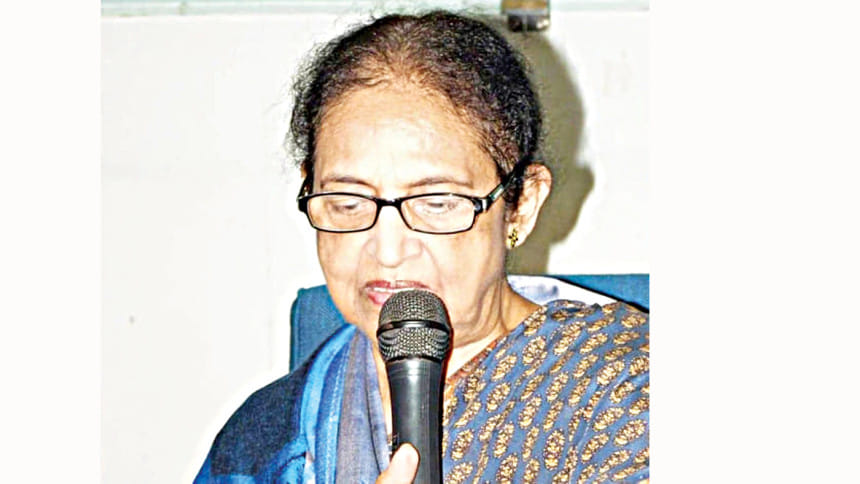Prof Najma Chowdhury passes away

Dhaka University Professor Emeritus Najma Chowdhury died yesterday, just a few days after testing positive for Covid-19.
She was 79.
A vital cog in the movement for women's education and rights in Bangladesh and a veteran educationist, Najma passed away while undergoing treatment at a Dhaka hospital.
"Prof Najma breathed her last around 8:00am yesterday due to old-age complications such as Parkinson's disease. She was admitted to hospital after testing positive for Covid-19," said Dr Sanzida Akhter, former chairperson of DU's women and gender studies department, which Najma had established in 2000.
"Prof Najma herself was an institution and, to us, she was like tree a that provided shade," Sanzida told The Daily Star.
She left behind two daughters -- Lamiya Chowdhury and Bushra Hasina Chowdhury. Bushra is a teacher at DU's international relations department.
Born in Sylhet on February 26, 1942, Najma Chowdhury was also an adviser to the caretaker government in 1996.
As her father Chowdhury Imamuzzaman was a civil engineer, she was brought up in different districts, including Dhaka and Rajshahi. Her mother Amirunnesa Khatun was a homemaker but she had a library in the house where Najma could spend hours delving into her favourite books.
She completed her SSC exams in 1956 and placed eighth among all girls under East Pakistan Secondary Education Board and placed ninth in HSC exams.
She played guitar in Bangladesh Betar before going to the UK for her PhD.
She joined DU's political science department in 1963 and did her PhD from London University's School of Oriental and African Studies under the commonwealth scholarship.
She came back in 1972 and was the chairperson of the political science department from 1984 to 1987. She introduced courses related to women's development and inspired her students to research on discrimination against women in society. She also established a research centre named Centre for Women Studies.
In 1988, Najma got a Fulbright fellowship as a visiting scholar in the US's Minnesota University. She edited a book, along with political scientist Barbara J Nelson named "Women and Politics Worldwide'', published by Yale University in 1994. The book achieved a Victoria Schuck Award.
She joined the UN's general assembly as a Bangladesh representative in 1978 till 1986. She played an important role in the Unesco conference in 1980 and the 1985 world women conference in Nairobi.
She was a former president of Women For Women, a founding member of the Human Development Foundation – both non-profit organisations.
She joined as a full-time professor at DU's women and gender studies department in 2003 and served as the chairperson of this department later.
She was given the "Rokeya Chair Professor" award by the University Grants Commission in 2007 as a researcher.
In 2008, She was nominated as a Professor Emeritus of the university and won the Ekushey Padak the same year.
Her husband was former chief justice Mainur Reza Chowdhury who died in 2004.
Prof Tania Haque, an ex-chairperson of the women and gender studies department, said, "She [Najma] was an inspiration and encouragement for the women in Bangladesh, she was an impossibly meritorious and wise person."
Chief Justice Syed Mahmud Hossain, DU Vice-Chancellor Prof Dr Md Akhtaruzzaman, the departments of political science and women and gender studies, and Bangladesh Mohila Parishad, among others, expressed deep shock at the death of the esteemed professor.
Najma was buried at the Banani graveyard after namaz-e-janaza at Gulshan's Azad Mosque.

 For all latest news, follow The Daily Star's Google News channel.
For all latest news, follow The Daily Star's Google News channel. 



Comments